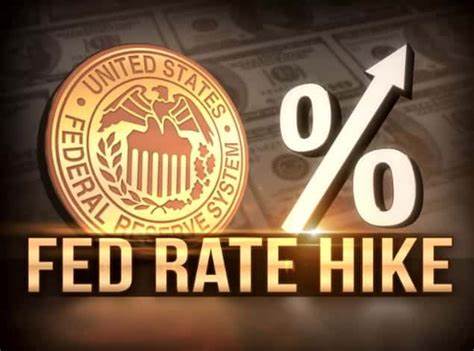Digital Zeitgeist – Fed to Increase Interest Rates Once More Amid Pressure on Core Inflation
The greatest economy in the world is preparing for an interest rate increase on Wednesday that might send it into recession.
The Federal Reserve is anticipated to increase its benchmark interest rate by another quarter of a percentage point, bringing it to a range of 5% to 5.25%. Given that the central bank prioritises the struggle against increasing prices, it would be the 10th consecutive rate increase. Interest rates were practically zero a year ago.
While core inflation, which excludes volatile energy and food prices, increased to 5.6% from 5.5% in March, the headline annual consumer inflation rate in the US fell to 5% from 6%.
On whether the Fed should stop raising rates, economists are divided. The head of the Washington, DC-based Peterson Institute think tank, Adam Posen, stated that the US central bank should “continue its hiking cycle given what the latest data is telling us.”
Robert J. Shapiro, a member of Bill Clinton’s economic team during his presidency, opined that the Fed should halt its current course since it had already done enough to stabilise the economy. Additional rate increases ran the risk of a recession that would harm low- and middle-income earners.
The first quarter of 2019 saw a dramatic slowdown in US economic growth, from 2.6% in the final three months of 2022 to only 1.1% year over year. It was significantly lower than the 2% growth forecasted by economists.
“A decline in economic growth to 1.1% shows it is time for the Fed to pause,” Shapiro said.
“There is a significant lag between interest rate rises being imposed and them taking effect, and so we know there is more pain for the economy to come even without further rate rises.”
Neil Shearing, chief economist at the consultancy Capital Economics, said the Fed would increase rates by a quarter of a percentage point. “Then it’s done. And that’s because there are already significant signs the economy is slowing.
“The labour market is cooling and given all the problems in the US banking system and tightening lending conditions, there won’t be any call for higher rates,” he added.
On Thursday, a quarter-point increase in interest rates in the eurozone is anticipated to follow an increase in rates in the US. The European Central Bank (ECB) is anticipated to increase its benchmark interest rate to 3.75% for a seventh straight time.
It is anticipated that the Bank of England would raise interest rates for the 12th consecutive time, to a level of 4.5%, the following week.
While everyone is struggling with rapidly rising prices, the inflation picture varies from place to place.
The most recent statistics for March showed a decrease in the headline rate in the US, while figures released on Tuesday indicated an increase in inflation in the Eurozone in April, rising to 7% from 6.9%. Inflation in the UK decreased from 10.4% in February but held steady at 10.1% in March.
Notwithstanding this, the measure of core inflation, which excludes the cost of energy, food, and transportation, is far higher than the rate that central bank policymakers think is acceptable.
Core inflation in March hit 5.7% in the UK, the Eurozone (before falling to 5.6% in the single currency bloc in April), and the US, while it was 5.6% in the UK.
It adds to the argument made by policymakers that higher interest rates are necessary to combat inflationary pressures by reducing demand for goods and services.
There is no question in the minds of City experts that interest rates in the US, UK, and Eurozone are poised to increase once again due to the sticky nature of core inflation. The only issue is which central banks will believe they have accomplished enough and which will argue that they must continue through this month.
In the immediate wake of the 2008 financial crisis, Posen was a dovish member of the monetary policy committee who supported lower rates and opposed those who wanted to raise borrowing costs to combat increasing inflation.
“I was described as an uber-dove. But this time the UK faces a different situation,” he said. “An additional raise by the Bank of England is a foregone conclusion and that is the right decision. The Bank is still behind the inflation curve, in my opinion.”
Former OECD (Organisation for Economic Cooperation and Development) senior economist John Llewellyn said that there was a good probability the Bank of England and the European Central Bank would be compelled to keep hiking interest rates until core inflation substantially declined.
online sources: theguardian.com, reuters.com

